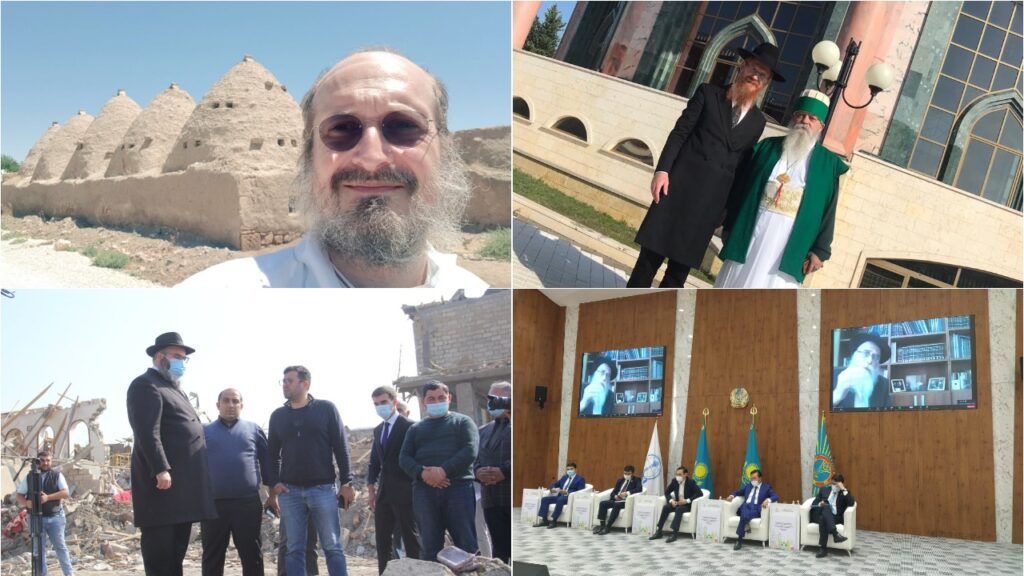In the footsteps of Chabad’s recent announcement that Rabbi Levi Duchman has been appointed as the official Chabad shaliach of the United Arab Emirates, Chabad is now considering establishing Chabad centers in additional Muslim countries.
“With the growing normalization between Muslim countries and Israel, we can expect to see a significant increase in the number of Jewish travelers and businesspeople to these areas,” Rabbi Yehuda Krinsky said last week.
“Chabad is exploring the possibilities of establishing centers to serve the religious and educational needs of Jews who will come to visit, do business or live there. Chabad has been serving Jewish communities in over a dozen Muslim countries, some for decades – and even in places where it wasn’t possible to establish centers until now.”
There currently are several existing Chabad centers in Muslim countries and there is even an organization uniting Rabbanim in these countries called the Alliance of Rabbis in Islamic States (ARIS), which was founded last year.
Rav Mendy Chitrik, the Chabad shaliach in Istanbul, Turkey, is the president of the organization, Rav Levi Duchman of the UAE serves as the vice-president, and Rabbi Levi Banon of Casablanca, Morocco, serves as the chairman, according to a Chareidim10 report.
Shalichim and/or Rabbanim in quite a number of Muslim countries are part of the alliance, including Rav Yeshaya Cohen of Kazakhstan, Rav Yoel Kaplan, the Chief Rabbi of Albania and Kosovo, Rav Shneor Segal, the Chief Ashkenazi Rabbi of Azerbaijan, Rav Yisrael Uzan of Nigeria, Rabbi Moshe Raskin, the Chief Rabbi of Uganda, Rabbi Arye Raichman, the Chief Rabbi of Kyrgyzstan, and Rav Chaim Azimov of North Cyprus. A Rav in Tunisia is also part of the alliance, as well as Rabbanim in other countries that cannot be named for security reasons.
“The organization was established in December 2019 to unite the Rabbanim of Muslim countries,” said Rav Chitrik. “It’s not a political organization – it only serves to assist Orthodox Rabbanim who work in Muslim countries and is open to all Orthodox Rabbanim in those countries.”
#Kosher meal @ the #Armani/Kaf at the @BurjKhalifa with my son @EliChitrik and my nephew @KorfMm…
Wonderful to be here! #UAE@dctabudhabi pic.twitter.com/z1W58U3vEG
— Rabbi Mendy Chitrik (@mchitrik) November 4, 2020
Rav Chitrik named some of the issues that arise for Rabbanim in Muslim countries and how they help one another, including assisting each other with “deliveries of tashmishei kedusha from place to place, sometimes under special circumstances. We also support members in dealing with the governments we work under. There’s no comparison to a Rav standing alone to a Rav backed by a Rabbinical organization. We provide advice to each other on how to deal with various issues that arise in Muslim countries.”
“And in general, just the publicity of Jewish life in Muslim countries is something very important. The reality of thriving Jewish communities in Muslim countries lowers the level of anti-Semitism, and on the other hand, it also helps to reduce the level of Islamophobia in the West.”
Regarding issues that arise that are specific to Muslim countries, Rav Chitrik says that both halachic and practical issues come up. “An example of a halachic issue is whether a Jew can participate in a Ramadan feast or whether a Jew can rely on the muezzin to determine the times of licht bentching and the end of Shabbos,” he said.
Take a look at some of the fascinating activities of ARIS Rabbanim below:
Jews continue to live their Judaism in the Islamic world: in Albania, Azerbaijan, Iran, Morroco, Turkey, Tunisia, Kazakhstan, Kosovo Kyrgyzstan, UAE, Uganda, Uzbekistan, Nigeria and more.
We will always welcome and bless peace!
Peace
שלום
سلام https://t.co/RcmmVXJ7zl— Alliance Rabbis Islamic States (@RabbisAlliance) October 18, 2020
The story of Abraham has began right here, in Harran, Turkey.
This week when we read the Torah portion we will remember our Father Abraham and walk in his way. pic.twitter.com/j1FTwb81kC
— Alliance Rabbis Islamic States (@RabbisAlliance) October 29, 2020
Chief Rabbi Segal visits the 600 strong Jewish community of #Ganja #Azerbaijan.
Rabbi Segal surveyed the damage caused by the shelling and prayed with the Jewish community for healing to the injured, for peace, stability and for the end of aggression.@presidentaz pic.twitter.com/k5HOr4Em4B
— Alliance Rabbis Islamic States (@RabbisAlliance) October 18, 2020
It is a real honor to be awarded as Honorary Ambassador of the Republic of Kosovo. It is also a strong commitment to do much more. Thanks Dear President @HashimThaciRKS for this great honor! https://t.co/UcDzkeQJum pic.twitter.com/SubPMdWggF
— Rabbi Yoel Kaplan (@ClRabbi) November 1, 2020
Jews at the Ashkenazi synagogue of #Baku #Azerbaijan pray during the holiday of #Sukkot together with Chief Rabbi Segal.
Jews live in Azerbaijan for thousands of years, enjoy freedom of practice, are very patriotic and love their country. @presidentaz@AzerbaijanMFA pic.twitter.com/IRtwtVHil8
— Alliance Rabbis Islamic States (@RabbisAlliance) October 8, 2020
(YWN Israel Desk – Jerusalem)











